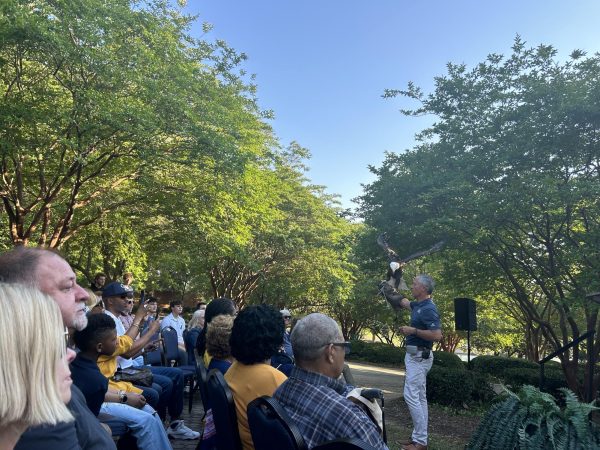GS professor publishes book on 2016 presidential campaign trail
September 27, 2017
Jared Yates Sexton, Georgia Southern University associate professor and author, recently released his new book which accounts and reflects on his experiences of political activism, political party observations and death threats following the 2016 presidential election.
Sexton has gained national renown for his political activism, closely following the 2016 election on Twitter, and contributing his opinion article titled “Donald Trump’s Toxic Masculinity” to the New York Times.
His new book, “The People Are Going to Rise Like the Waters Upon Your Shore,” was released on Aug. 15, and Sexton feels good about the public’s reaction so far.
“It was my attempt to explain what happened with the 2016 election and I think I’ve been able to reach some people and I think it’s been good in that way,” Sexton said.
In his book, Sexton explores what he witnessed while on the campaign trail and analyzes why political parties were acting the way that they were.
“The left is split, the right is split, and then everybody is just split,” Sexton said.
According to Sexton, this division in politics is what led to the radicalization of parties that we have now. In accordance with the “Horseshoe Theory,” Sexton explains that the left and the right are on such different sides that their political bases begin to resemble one another in their demonstrations.
Sexton said he saw some people use Bernie Sanders, a democratic socialist on the left, as an outlet to promote anarchy and to support a cause to tear down the government and its perceived corruption. He said he saw cars lit on fire and people in fist fights at Bernie Sanders rallies.
The main focal point in his book is Sexton’s observation of President Donald Trump’s base and of what it consisted.
Sexton claims that Trump’s supporters see Trump and his followers as a team, someone who is finally allowing them to say what has been on their mind no matter how offensive or politically incorrect it happens to be.
“Trump wasn’t the cause, he was the disease personified,” Sexton said in his book.
Death Threats
In his book, Sexton goes into detail about the way that many Trump supporters view him and his work. He said that he has received death threats, and they haven’t stopped with Trump’s election into the white house.
“Sadly it’s [threats] just become part of my life,” Sexton said. “It’s ongoing, I get phone calls every now and then.”
Sexton said in his book that when these initial invasive threats were happening that he had to check every room in his house at night, install a security system, and even resort to protecting himself with firearms.
These threats, while unnerving, do serve one main purpose for Sexton. They give him an indication of the impact of his work.
“If I go out and do a piece of reporting, the moment I start getting threats is when I realize that I did good work,” Sexton said.
Social Bubbles
In his book, Sexton describes an interaction with a man at a Trump rally in who believed that less than 10 percent of Americans are liberals. The man backed up this claim by stating that he hardly ever interacts with or knows any liberals.
According to Sexton, the ability for people to create social bubbles consisting only of people that they agree with, especially online, allows people to create views of the world that may not be exactly true, and may even discredit dissenting world views.
“We have these people now who are able to construct their realities to suit themselves,” Sexton said. “You can take this trajectory now where you get rid of any dissenting opinion, you dehumanize it, and when you do that, you don’t have to question your own beliefs anymore.”
The Blurring Lines of Objectivity
“I tried really hard to tell the truth as it was,” Sexton said. “Objective reality is almost extinct now… I wrote a book that I guarantee people read and they think it has a liberal slant, and that’s totally fine, but I was critical of both sides.”
Sexton said that as we move into a politically divided climate, true objectivity is slipping away.
“I saw the rise of fascism in this country, and I reported on it to the best of my ability,” Sexton said. “I tried the closest I could to get to objective reality while understanding that we don’t live in objective times.”














